Monthly Archives: November 2022
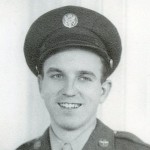
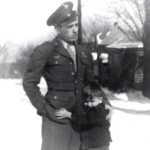 Veteran’s Day is a day about sacrifice and honor, duty and dedication, war and peace, but the day cannot pass for me without thoughts of my dad, and how much I miss him. I know I am not alone in these thoughts, because my sisters also miss him, as well as the rest of our family. My dad Staff Sergeant Allen L Spencer, fought in World War II, serving as flight engineer and top turret gunner on a B-17G Bomber. Dad came home after his successful service, which is why my sisters and I are alive, and why he was a veteran. A veteran is someone who served in the military and came home after.
Veteran’s Day is a day about sacrifice and honor, duty and dedication, war and peace, but the day cannot pass for me without thoughts of my dad, and how much I miss him. I know I am not alone in these thoughts, because my sisters also miss him, as well as the rest of our family. My dad Staff Sergeant Allen L Spencer, fought in World War II, serving as flight engineer and top turret gunner on a B-17G Bomber. Dad came home after his successful service, which is why my sisters and I are alive, and why he was a veteran. A veteran is someone who served in the military and came home after.
Soldiers really are a rare bread, created by God to go out and protect those who cannot protect themselves, even when those they protect don’t know or even care that it is a soldier who has watched over them, their borders, and their homes. The sacrifice a veteran gave was not about dying, although they will do that if it is what is required of them. The sacrifice of a veteran is being away from their family and friends. Some veterans miss out on their babies being born, their wedding anniversaries, weddings of family members, and so much more. They don’t know most of, if any of the people they are protecting, but they go anyway, because they are needed. Lives depend on their loyalty.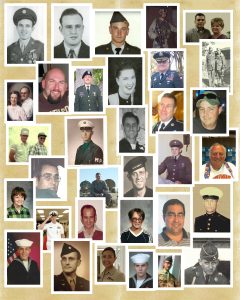
These men and women deserve our respect and that is what today is all about. It is a day to remind our veterans that we are grateful for their service, and happy that they were able to return to us and to their family members. War is a horrible thing, and no one really wants to be so far away from home fighting in a war they didn’t start, and one they wish hadn’t ever taken place. Unfortunately, evil exists in our world, and because it does, soldiers are a vital part of our security. God knew that soldiers would have to be people of honor and dedication, with a strong sense of duty and love for their fellow man. They would have to be people of courage and bravery…able to bite back the fear that dwells all around them. God knew the kind of people they would have to be…heroes. And that is what every veteran is, was, and always will be…a hero. Today is Veteran’s Day. It is a day to honor those who have given so much to keep us free. Thank you all for your great service. God bless you…every one of you.
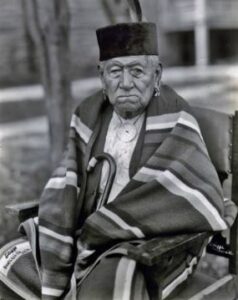
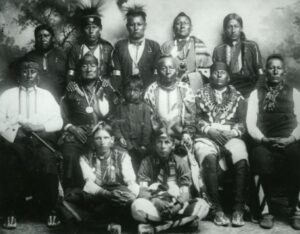 During the years when America was expanding very quickly, many Native American nations were placed on reservations, and the land they had previously lived on was taken from them…often by force, but sometimes by choice. Some Indians saw the writing on the wall and chose to go to the reservation so their people could survive. Those who didn’t found themselves in multiple battles that often ended in death.
During the years when America was expanding very quickly, many Native American nations were placed on reservations, and the land they had previously lived on was taken from them…often by force, but sometimes by choice. Some Indians saw the writing on the wall and chose to go to the reservation so their people could survive. Those who didn’t found themselves in multiple battles that often ended in death.
One group, the Osage Tribe made the decision to abandon their lands in Missouri and Aransas, giving it to the White Man’s Government, in exchange for the reservation in Oklahoma that was offered to them. I’m sure there were those within the tribe who were not happy with the decision that was made, but time would prove that it was the wisest decision to make. The decision made at that time, would later make them one of the wealthiest surviving Native American nations. The Osage Tribe was, at one time, the largest tribe of the Southern Sioux people. They occupied what are now the states of Missouri, Kansas, and Nebraska. This sophisticated tribe of people surprised the first Anglo explorers and settlers. When the settlers moved into the region, they found this Native American tribe living in more or less permanent villages made of sturdy earthen and log lodges. They really didn’t expect these people, whom they considered to be primitive, to be in such modern-day (for the times anyway) homes. The Osage Tribe is related to the Quapaw, Ponca, Omaha, and Kansa peoples. Like their cousins the Plains Indians, the Osage Tribe hunted buffalo and wild game, but they also raised crops to supplement their diets. They were really forward thinking, which was unusual for the times.
Americans found it much easier to understand and negotiate with the Southern Sioux, even though they often warred among themselves. They felt like they could understand the Southern Sioux much easier, because of their more sedentary ways…thing that the more nomadic Northern Sioux just didn’t make sense in that they just seemed to wander around. The White Man didn’t understand that kind of thinking. Maybe it was the more permanent homes offered by the American negotiators, that convinced the Osage Tribe to abandon their traditional lands and move peacefully to a reservation in southern Kansas in 1810. Unfortunately, that would not be the move that made the White Man happy, so when American settlers began to covet the Osage reservation in Kansas, the tribe agreed to yet another move, relocating to what is now Osage County, Oklahoma, in 1872.
While the American settlers found it easier to work with the Osage Tribe and the Southern Sioux, they were not always truly fair with them. The American settlers constantly pressured the government to push Native Americans off valuable lands and onto marginal reservations. Unfortunately, this practice was all too common throughout the history of western settlement. Most tribes were devastated by these relocations, including some of the Southern Sioux tribes like the Kansa, whose population of 1,700 was reduced to only 194 following their disastrous relocation to a 250,000-acre reservation in Kansas. Nevertheless, the Osage tribe, proved unusually 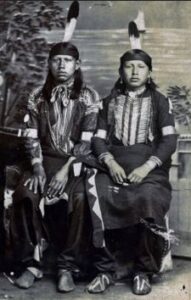
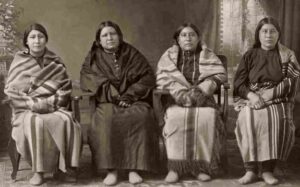 successful in adapting to the demands of living in a world dominated by Anglo-Americans. Of course, a big part of their success and wealth is due in part to the presence of large reserves of oil and gas on their Oklahoma reservation, as well as the effective management of the grazing contracts set up with the Anglos. During the twentieth century, the Osage amassed enormous wealth from their oil and gas deposits, eventually becoming the wealthiest tribe in North America.
successful in adapting to the demands of living in a world dominated by Anglo-Americans. Of course, a big part of their success and wealth is due in part to the presence of large reserves of oil and gas on their Oklahoma reservation, as well as the effective management of the grazing contracts set up with the Anglos. During the twentieth century, the Osage amassed enormous wealth from their oil and gas deposits, eventually becoming the wealthiest tribe in North America.
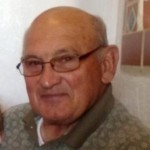
 I married into the Schulenberg family almost 48 years ago. During the early years, when we would make trips to Forsyth, Montana to visit my husband, Bob Schulenberg’s family that lived there. One such visit was for a family reunion. It was at that reunion, that I first met my father-in-law, Walt Schulenberg’s half-brother, Butch Schulenberg. For many years, I didn’t see Butch again, and then when my father-in-law passed away in 2015, we were making calls to tell family of his passing. I spoke to Uncle Butch, and it was such a nice, even while sad, call, that Uncle Butch became a very dear uncle to me. I love his kind heart and his caring ways. I think everyone loves Butch Schulenberg, because that is the kind of man he is.
I married into the Schulenberg family almost 48 years ago. During the early years, when we would make trips to Forsyth, Montana to visit my husband, Bob Schulenberg’s family that lived there. One such visit was for a family reunion. It was at that reunion, that I first met my father-in-law, Walt Schulenberg’s half-brother, Butch Schulenberg. For many years, I didn’t see Butch again, and then when my father-in-law passed away in 2015, we were making calls to tell family of his passing. I spoke to Uncle Butch, and it was such a nice, even while sad, call, that Uncle Butch became a very dear uncle to me. I love his kind heart and his caring ways. I think everyone loves Butch Schulenberg, because that is the kind of man he is.
Uncle Butch is a veteran, having served in the Army during the Vietnam War. He was a respected member of 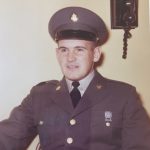
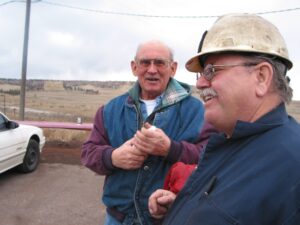 his company. Butch was chosen to be a driver for an officer. Butch told my husband, Bob and me several stories about his driving days in the service. He told us of so many interesting details that he was privileged to know, but at that time could not speak of. During war, the soldiers are very restricted on what information they can share, mostly because disclosing information could be a detriment to the whole company. Now that the war is long-over, the details of their operations are history…very interesting history. That is something Butch ad I have in common too…history. We both love the details of the past, and the impact they have had on the future. I am proud of his service. He is the kind of soldier this nation is blessed to have…and I’m very thankful he made it home.
his company. Butch was chosen to be a driver for an officer. Butch told my husband, Bob and me several stories about his driving days in the service. He told us of so many interesting details that he was privileged to know, but at that time could not speak of. During war, the soldiers are very restricted on what information they can share, mostly because disclosing information could be a detriment to the whole company. Now that the war is long-over, the details of their operations are history…very interesting history. That is something Butch ad I have in common too…history. We both love the details of the past, and the impact they have had on the future. I am proud of his service. He is the kind of soldier this nation is blessed to have…and I’m very thankful he made it home.
These days, Uncle Butch is busy enjoying his retirement, and going to visit his children and grandchildren. He 
 loves taking pictures around his house in Forsyth, Montana. He is a huge fan of the local school sports teams and goes to or listens to as many games as he possibly can. He is one of their biggest fans. He is very community oriented. He loves his small town and feels very connected to all the people there. He is very much a loved member of the community, and he loves all of them too. Today is Butch’s 82nd birthday. Happy birthday Butch!! Have a great day!! We love you!!
loves taking pictures around his house in Forsyth, Montana. He is a huge fan of the local school sports teams and goes to or listens to as many games as he possibly can. He is one of their biggest fans. He is very community oriented. He loves his small town and feels very connected to all the people there. He is very much a loved member of the community, and he loves all of them too. Today is Butch’s 82nd birthday. Happy birthday Butch!! Have a great day!! We love you!!
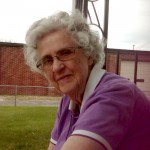
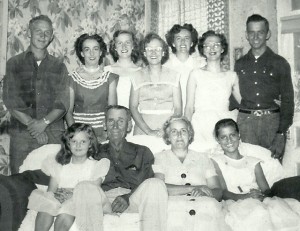 My aunt, Evelyn Hushman was the eldest of my grandparents, George and Hattie Byer’s nine children. Big families have a different dynamic than small families. My own daughter, Corrie Petersen was too close in age to her younger sister, Amy Royce to be of help in raising her sister. That was just not how our family worked, but my grandparents’ family, and even my own parents’ family, were big enough for the children to have a hand in raising the younger children. Some people consider that a privilege, and others consider it a burden. There is no right or wrong way to feel about it. It just is the way it is. I don’t know how any of my siblings felt about things or even how my aunts and uncles felt about it, but I think that my parents and grandparents always felt thankful for the help the older children gave, because families of any size can be exhausting.
My aunt, Evelyn Hushman was the eldest of my grandparents, George and Hattie Byer’s nine children. Big families have a different dynamic than small families. My own daughter, Corrie Petersen was too close in age to her younger sister, Amy Royce to be of help in raising her sister. That was just not how our family worked, but my grandparents’ family, and even my own parents’ family, were big enough for the children to have a hand in raising the younger children. Some people consider that a privilege, and others consider it a burden. There is no right or wrong way to feel about it. It just is the way it is. I don’t know how any of my siblings felt about things or even how my aunts and uncles felt about it, but I think that my parents and grandparents always felt thankful for the help the older children gave, because families of any size can be exhausting.
For many years, my Aunt Evelyn, her husband, my Uncle George Hushman, and my parents, Al and Collene Spencer, bowled on a bowling league. Then as their children grew up, we all bowled too. That is a legacy we likely owe to our parents. I’m not sure any of the others still bowl today, but I do, as does my husband, Bob Schulenberg. We have bowled now for 44 years. When I think about that, it is a legacy. I’m not a professional bowler or anything…far from it, but I can hold my own on among the amateurs, and for me, that all went back to the league my parents and Aunt Evelyn and Uncle George bowled on.
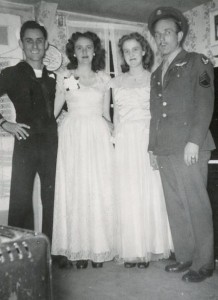
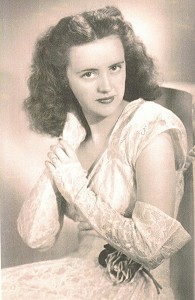 In reality, my parents and my aunt and uncle did many things together. They were really best friends. They double dated many times, including the date that almost cost them their lives. They were coming home from a date and my dad was driving. They were taking Aunt Evelyn and Uncle George home, when they were struck by a train. They would have all died at the unlit, uncontrolled, crossing being hit by a train with no lights on, if my Uncle George hadn’t caught sight of a reflection, and yelled to my dad, “Train!!” Dad reacted by turning with the train, thereby saving the lives of all four of them. They weren’t even injured. So, I guess we their children, owe our lives to them, in more ways than one. Today would have been Aunt Evelyn’s 94th birthday. Happy birthday in Heaven, Aunt Evelyn. We love and miss you very much.
In reality, my parents and my aunt and uncle did many things together. They were really best friends. They double dated many times, including the date that almost cost them their lives. They were coming home from a date and my dad was driving. They were taking Aunt Evelyn and Uncle George home, when they were struck by a train. They would have all died at the unlit, uncontrolled, crossing being hit by a train with no lights on, if my Uncle George hadn’t caught sight of a reflection, and yelled to my dad, “Train!!” Dad reacted by turning with the train, thereby saving the lives of all four of them. They weren’t even injured. So, I guess we their children, owe our lives to them, in more ways than one. Today would have been Aunt Evelyn’s 94th birthday. Happy birthday in Heaven, Aunt Evelyn. We love and miss you very much.
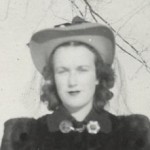
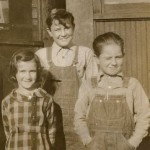 My aunt, Ruth Wolfe was the person I most closely resembled. She was my dad, Allen Spencer’s sister, and for most of my life, I didn’t really know that I resembled her. Nevertheless, I am built like she was. I laugh like she did, something I found out after she passed away, and I laughed, but when I did, I heard her laughing. I thought, “How could that be?” I had never noticed that I laughed like her before. I began to wonder how I hadn’t noticed it before. Whatever the reason, I did and do laugh like her, and these days, it is a pleasant reminder of her, and the memories are very sweet.
My aunt, Ruth Wolfe was the person I most closely resembled. She was my dad, Allen Spencer’s sister, and for most of my life, I didn’t really know that I resembled her. Nevertheless, I am built like she was. I laugh like she did, something I found out after she passed away, and I laughed, but when I did, I heard her laughing. I thought, “How could that be?” I had never noticed that I laughed like her before. I began to wonder how I hadn’t noticed it before. Whatever the reason, I did and do laugh like her, and these days, it is a pleasant reminder of her, and the memories are very sweet.
I always loved Aunt Ruth…and her husband, Uncle Jim too. They lived what seemed like such an exciting life. When they moved away from Casper, Wyoming, they moved to Reno, Nevada, and later to Vallejo, California, and finally to Newport, Washington. While Washington was rather a calm place, almost a retirement of sorts, Reno and Vallejo seemed like an exciting, party kind of place…and maybe it was. People go through different 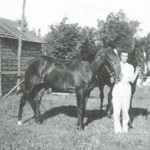
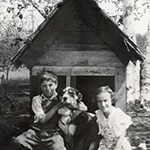 phases in life, and maybe they were in a phase of looking for some excitement. A small town, like Casper, Wyoming, while not tiny, is certainly not as exciting as a place like Reno, Nevada or Vallejo, California. Still, Newport, Washington, and especially the mountain top property they purchased, was certainly more like the places she lived when she was growing up. It was almost like going back to her roots.
phases in life, and maybe they were in a phase of looking for some excitement. A small town, like Casper, Wyoming, while not tiny, is certainly not as exciting as a place like Reno, Nevada or Vallejo, California. Still, Newport, Washington, and especially the mountain top property they purchased, was certainly more like the places she lived when she was growing up. It was almost like going back to her roots.
I think that some of the happiest times in Aunt Ruth’s life were when she and Uncle Jim were on the road, traveling. They liked to see the world around them, and they loved showing up unannounced to surprise us. I don’t think they ever thought about the fact that they might find us out of town, and to my knowledge, they never did…or at least if they did, they never told us about it. I suppose if they had told us they were coming, it would have ruined the adventure of things. I don’t think any of us ever minded the 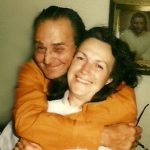
 surprises that came with their unexpected visits. My parents were always happy that they were there. It was like running into a favorite old friend…but they were old friends, even more so than some siblings are. Aunt Ruth and my dad were just 19 months apart. They were the youngest of my grandparents four children, and in many ways, that did make them close, even though they were brother and sister, and not brother/friends, like my dad and their older brother, my Uncle Bill. Today would have been my Aunt Ruth’s 97th birthday. Happy birthday in Heaven, Aunt Ruth. We love and miss you very much.
surprises that came with their unexpected visits. My parents were always happy that they were there. It was like running into a favorite old friend…but they were old friends, even more so than some siblings are. Aunt Ruth and my dad were just 19 months apart. They were the youngest of my grandparents four children, and in many ways, that did make them close, even though they were brother and sister, and not brother/friends, like my dad and their older brother, my Uncle Bill. Today would have been my Aunt Ruth’s 97th birthday. Happy birthday in Heaven, Aunt Ruth. We love and miss you very much.

 My great grandnephew, Aysa Balcerzak is turning one today. I can hardly believe he is a year old already. This sweet smiley little boy is always happy, although his parents might disagree with me, but I only see his best faces, so I’ll go with what I see. Aysa loves spending time with his big sister, Reece, who is just as smiley as her brother, and loves that she has a little brother. Reece loves “showing her brother the ropes” about things, and Aysa is really having a good time exploring the world around him. He really is learning the ropes, like what all these leaves on the ground are all about and that food is fun to eat…and to play with. Of course, he is also exploring the multiple toys he now has, and as we all know, that collection will quickly grow. It is just the way it goes with kids.
My great grandnephew, Aysa Balcerzak is turning one today. I can hardly believe he is a year old already. This sweet smiley little boy is always happy, although his parents might disagree with me, but I only see his best faces, so I’ll go with what I see. Aysa loves spending time with his big sister, Reece, who is just as smiley as her brother, and loves that she has a little brother. Reece loves “showing her brother the ropes” about things, and Aysa is really having a good time exploring the world around him. He really is learning the ropes, like what all these leaves on the ground are all about and that food is fun to eat…and to play with. Of course, he is also exploring the multiple toys he now has, and as we all know, that collection will quickly grow. It is just the way it goes with kids.
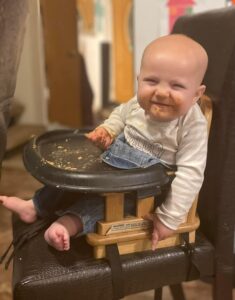

Aysa is learning the art of coaching his big sister’s sporting events…with a little help from his daddy, Keifer Balcerzak. He loves to be right there on the field, so he can see all the action firsthand.
I suppose there will come a time when Aysa will be more into sports that Reece will, so it makes sense that he should watch closely. I know that because his daddy and grandpa, Dave Balcerzak both love sports, and quite likely his other grandparents do too, so Aysa comes from a long line of sports people. I know he will grow right into it.
While he loves watching sports, Aysa is also a cuddly boy. He loves snuggling up with his family, and they 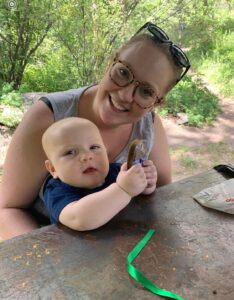
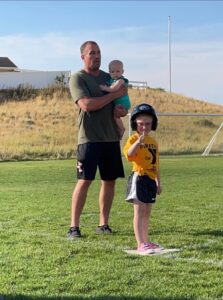 should really enjoy that while the can, because as we all know, most little boys grow out of the cuddly phase pretty quickly. I mean, a school aged boy can’t be seen hugging on his mom and such. Still, some boys don’t care, and maybe Aysa will be one of those. It’s always fun to have a boy who just loves giving hugs, because so many don’t. Whether Aysa continues to be a cuddly child or not, remains to be seen, but nevertheless, Aysa is a sweet little boy, who has captured the hearts of all who know him. His smiley face, and cheerful personality, make him a child who is so much fun to be around. Aysa is just perfect in every way. Today is Aysa’s first birthday. Happy 1st birthday Aysa!! Have a wonderful day, sweet boy!! We love you!!
should really enjoy that while the can, because as we all know, most little boys grow out of the cuddly phase pretty quickly. I mean, a school aged boy can’t be seen hugging on his mom and such. Still, some boys don’t care, and maybe Aysa will be one of those. It’s always fun to have a boy who just loves giving hugs, because so many don’t. Whether Aysa continues to be a cuddly child or not, remains to be seen, but nevertheless, Aysa is a sweet little boy, who has captured the hearts of all who know him. His smiley face, and cheerful personality, make him a child who is so much fun to be around. Aysa is just perfect in every way. Today is Aysa’s first birthday. Happy 1st birthday Aysa!! Have a wonderful day, sweet boy!! We love you!!

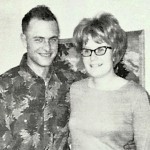 Whenever our aunt, Pearl Hein talked about her husband, our uncle, Eddie Hein, she always called him Big Ed. It was her “pet name” for him…kind of like saying he was her superhero. That is truly how Pearl felt about Eddie. Theirs was a long-standing marriage of 52 years at the time of Eddie’s graduation to Heaven. He was her superhero, and she was his too. It was always fun to watch them, because their personalities were very similar, and yet each was unique.
Whenever our aunt, Pearl Hein talked about her husband, our uncle, Eddie Hein, she always called him Big Ed. It was her “pet name” for him…kind of like saying he was her superhero. That is truly how Pearl felt about Eddie. Theirs was a long-standing marriage of 52 years at the time of Eddie’s graduation to Heaven. He was her superhero, and she was his too. It was always fun to watch them, because their personalities were very similar, and yet each was unique.
I first met them on my first trip to Forsyth, Montana to visit my husband, Bob Schulenberg’s family, and the trip was so much fun that for many years we went for a visit every summer. I loved all of the Forsyth family and looked forward to it every year. Eddie and Pearl lived at the edge of town beside the dike that held the Yellowstone River back from the town. Eddie and Pearl always had a vegetable garden, and they canned lots of their food. 
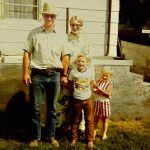 Eddie transformed their house from the original mobile home to a house and decorated it in various places with river rock. The fireplace was a beautiful focal point.
Eddie transformed their house from the original mobile home to a house and decorated it in various places with river rock. The fireplace was a beautiful focal point.
Eddie, and Pearl too, had what I call a smiling face. Their whole face smiled with they smiled, and that is a very cool kind of face to have. I think it is a sign of a really happy person too. They loved to entertain, and they loved to laugh and joke. Some of my fondest memories are when they were picking on my husband, Bob. He had long hair back then, but everyone in the hippy generation did, so he wasn’t alone. Eddie was always threatening to give him a buzz cut, and one time went after him with the shears, but of course, they weren’t plugged in. Nevertheless, it was funny, and unless you looked closely, you might think they were plugged in. The picture is funny anyway. It’s funny stuff like that that I think I miss the most about Eddie. There was really never a dull moment when we were over at their house.

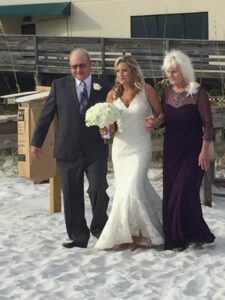
Eddie went home to be with the Lord on October 16, 2019, and I still can’t believe he is gone. He had a stroke a few years earlier, and fought his way back, with much help from Pearl, who was his “rock” during those days. I think one of his happiest moments after the stroke, was when he was able to walk his daughter Kim down the aisle when she married Michael Arani on October 7, 2017. I don’t think he thought he would be able to do it, but Eddie was a strong man, and he was determined. I’m so happy that he got to see that day. Today would have been Eddie’s 79th birthday. Happy birthday in Heaven, Eddie. We love and miss you very much.
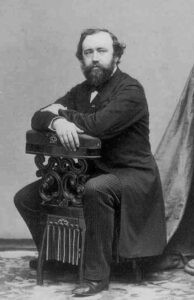
 Antoine-Joseph Sax was born on November 6, 1814, in Dinant, which is now part of Belgium, to Charles-Joseph Sax and his wife Marie-Joseph née Masson Sax. As a child, Antoine, nicknamed Adolphe was quite accident prone, and some say that it is a wonder he made it to his teenaged years, much less to adulthood.
Antoine-Joseph Sax was born on November 6, 1814, in Dinant, which is now part of Belgium, to Charles-Joseph Sax and his wife Marie-Joseph née Masson Sax. As a child, Antoine, nicknamed Adolphe was quite accident prone, and some say that it is a wonder he made it to his teenaged years, much less to adulthood.
As a boy, Sax faced many brushes with death. As a child, he once fell out a window from a height of three floors, hit his head on a stone and was believed dead. At the age of three, he drank a bowl full of acidic water, because it looked like milk to the boy. Later, he swallowed a pin. He received serious burns from a gunpowder explosion, and once fell onto a hot cast-iron frying pan, burning his side. Several times he avoided accidental poisoning and asphyxiation from sleeping in a room where varnished furniture was drying. Another time young Sax was struck on the head by a cobblestone and fell into a river, almost dying. His mother once said that “he’s a child condemned to misfortune; he won’t live.” His neighbors called him “little Sax, the ghost.”
Sax came from a musical family. His father and mother were instrument designers, who made several changes 
 to the design of the French horn. At an early age, Adolphe began to make his own instruments. At the age of 15 years, he entered two of his flutes and a clarinet into a competition. He went on to study performance on those two instruments, as well as voice at the Royal Conservatory of Brussels. Adolphe relocated permanently to Paris in 1842 and began working on a new set of valved bugles. As with the rest of his childhood, even the invention of the saxophone was an accident of sorts…being the result of a modified saxhorn he’d created with his father, Charles Joseph Sax, in 1845.
to the design of the French horn. At an early age, Adolphe began to make his own instruments. At the age of 15 years, he entered two of his flutes and a clarinet into a competition. He went on to study performance on those two instruments, as well as voice at the Royal Conservatory of Brussels. Adolphe relocated permanently to Paris in 1842 and began working on a new set of valved bugles. As with the rest of his childhood, even the invention of the saxophone was an accident of sorts…being the result of a modified saxhorn he’d created with his father, Charles Joseph Sax, in 1845.
While he did not invent what became known as saxhorns, his examples were much more successful than those of his rivals. Hector Berlioz, French Romantic composer and conductor was so enamored of Adolphe’s saxhorn examples, that he arranged in February 1844 for one of his pieces to be played entirely on saxhorns. The 
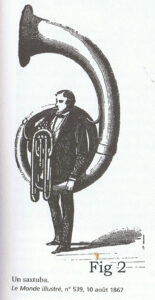
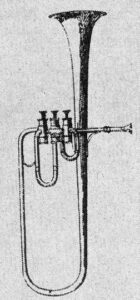 composition called for seven different sizes of saxhorns, and it was this composition that paved the way for the creation of the flugelhorn.
composition called for seven different sizes of saxhorns, and it was this composition that paved the way for the creation of the flugelhorn.
In 1845, Adolphe Sax also developed the saxotromba family, which were valved brass instruments bearing a narrower bore than the saxhorns. These were not as successful, and soon became a thing of the past. Sax went on to become an instructor at the Paris Conservatory. True to his earlier live of catastrophic events, Sax developed lip cancer in his later life, and true to his past, he survived that as well. Nevertheless, the catastrophic events continued, and Sax died of pneumonia in Paris, in relative poverty in 1894.
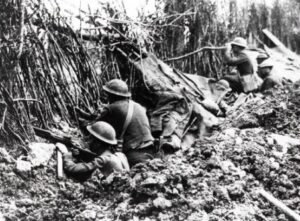
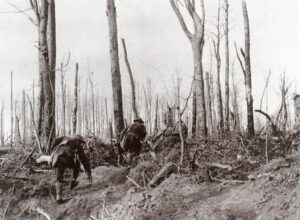 When I think of war and of the largest offensive in United States history, I don’t picture a battle in World War I. Nevertheless, I should. The Meuse–Argonne offensive, which was also called the Meuse River–Argonne Forest offensive, the Battles of the Meuse–Argonne, and the Meuse–Argonne campaign, depending on who you were, was a major part of the final Allied offensive of World War I that stretched along the entire Western Front. The offensive ran for a total of 47 days, from September 26, 1918, until the Armistice of November 11, 1918, and it was the largest in United States military history, past or present.
When I think of war and of the largest offensive in United States history, I don’t picture a battle in World War I. Nevertheless, I should. The Meuse–Argonne offensive, which was also called the Meuse River–Argonne Forest offensive, the Battles of the Meuse–Argonne, and the Meuse–Argonne campaign, depending on who you were, was a major part of the final Allied offensive of World War I that stretched along the entire Western Front. The offensive ran for a total of 47 days, from September 26, 1918, until the Armistice of November 11, 1918, and it was the largest in United States military history, past or present.
The offensive involved 1.2 million American soldiers, and as battles go, it is the second deadliest in American history. During the course of the battle, there were over 350,000 casualties including 28,000 German lives, 26,277 American lives, and an unknown number of French lives. The losses involving the United States were compounded by the inexperience of many of the troops, the tactics used during the early phases of the operation, and in no small way…the widespread onset of the global influenza outbreak called the “Spanish flu.” The 1918 Spanish Flu pandemic, also known as the Great Influenza epidemic, was an exceptionally deadly 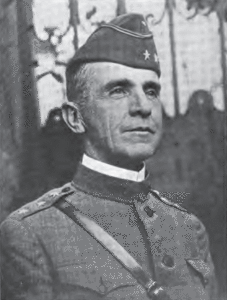
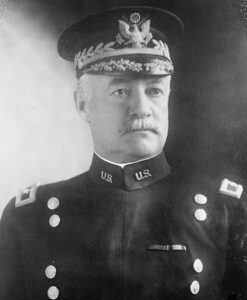 global influenza pandemic caused by the H1N1 influenza A virus. The pandemic affected an estimated 500 million people, or approximately a third of the global population. It is estimated that 17 to 50 million, and possibly as high as 100 million people lost their lives, which probably increased the deaths during the Meuse-Argonne offensive.
global influenza pandemic caused by the H1N1 influenza A virus. The pandemic affected an estimated 500 million people, or approximately a third of the global population. It is estimated that 17 to 50 million, and possibly as high as 100 million people lost their lives, which probably increased the deaths during the Meuse-Argonne offensive.
The Meuse–Argonne was the principal engagement of the American Expeditionary Force (AEF) during World War I, and it was what finally brought the war to an end. It was the largest and bloodiest operation of World War I for the AEF. Nevertheless, by October 31, the Americans had advanced 9.3 miles and had cleared the Argonne Forest. The French advanced 19 miles to the left of the Americans, reaching the Aisne River. The American forces split into two armies at this point. General Liggett led the First Army and advanced to the Carignan-Sedan-Mezieres Railroad. Lieutenant General Robert L Bullard led the Second Army and was directed to move eastward toward Metz. The two United States armies faced portions of 31 German divisions during this phase. The American troops captured German defenses at Buzancy, allowing French troops to cross the Aisne River. There, they rushed forward, capturing Le Chesne, also known as the Battle of Chesne (French: Bataille du Chesne).
In the final days, the French forces conquered the immediate objective, Sedan and its critical railroad hub in a 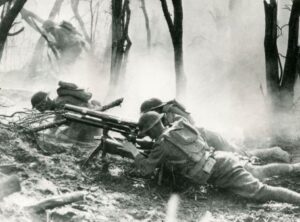
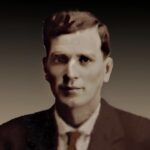
battle known as the Advance to the Meuse (French: Poussée vers la Meuse), and on November 6, American forces captured surrounding hills. On November 11, news of the German armistice put a sudden end to the fighting. That was fortunate for the armies, but for my 1st cousin twice removed, William Henry Davis, it was six days too late. He lost his life on November 5, 1918, on the west bank of the Meuse during these battles. He was just 30 years old at the time.
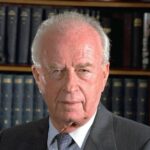
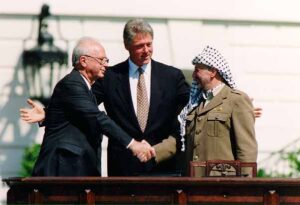 Since time began, people have hoped for peace, and ended up in a battle. While “world peace” will likely never be an option, at least not in this world, governments continue to try, and those who oppose peace continue to do their best to sabotage the plans for peace. Israel has often been at the center of the battle for peace, which makes no logical sense. The other Arab nations have long been after the land, small as it is, that belongs to Israel. I never understood how they could covet the small piece of land that Israel had. The reality is that the Arab nations simply don’t want Israel to exist at all.
Since time began, people have hoped for peace, and ended up in a battle. While “world peace” will likely never be an option, at least not in this world, governments continue to try, and those who oppose peace continue to do their best to sabotage the plans for peace. Israel has often been at the center of the battle for peace, which makes no logical sense. The other Arab nations have long been after the land, small as it is, that belongs to Israel. I never understood how they could covet the small piece of land that Israel had. The reality is that the Arab nations simply don’t want Israel to exist at all.
In 1995, a rally was being held in support of the Oslo Accords at the Kings of Israel Square in Tel Aviv. A number of people had warned Yitzhak Rabin, the fifth prime minister of Israel, that his life could be in danger, but he would not back down. The Oslo Accords was a pair of agreements between Israel and the Palestine Liberation Organization (PLO). The Oslo I Accord was signed in Washington DC, in 1993. The Oslo II Accord was signed in Taba, Egypt, in 1995. The problem with these agreements is that the battle between these two groups goes so much deeper than just who owns the land. These nations are related and have been in a feud since the time of Jacob and Esau in Biblical days. Nevertheless, nations have tried to bring about peace between the two nations ever since the battle began.
On November 4, 1995 (12 Marcheshvan 5756 on the Hebrew calendar) at 9:30pm, at the end of the rally. An Israeli ultranationalist named Yigal Amir, who radically opposed Prime Minister Yitzhak Rabin’s peace initiative, and particularly the signing of the Oslo Accords, took it upon himself, to assassinate Yitzhak Rabin. The Likud leader and future prime minister, Benjamin Netanyahu, told Rabin’s government that withdrawing from any “Jewish” land was heresy, which I would have to agree with, because the land had been given to them by God. They believed that Rabin was probably too secular and too far removed from the Biblical Jewish tradition and Jewish values, but assassination is never the answer.
Conservative rabbis associated with the settlers’ movement prohibited territorial concessions to the Palestinians and forbade soldiers in the Israel Defense Forces from evacuating Jewish settlers under the accords. Some rabbis proclaimed “din rodef” based on a traditional Jewish law of self-defense, against Rabin personally, arguing that the Oslo Accords would endanger Jewish lives. The whole situation, which was “designed” to bring “peace,” took on a completely different tone…chaos. While I would never condone violence or assassination, I 
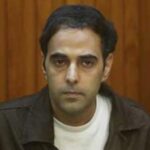 don’t think Israel should ever be forced to give up parts of its land, and unfortunately, any peace agreement with the Palestinians always includes taking Israeli land, when Arab land is already far, far bigger. During the trial, Amir admitted to the assassination of Yitzhak Rabin and claimed that he was justified in doing so, saying that Amir he was “satisfied” and was acting on the “orders of God.” Following the trial, Amir was sentenced to life imprisonment for the murder of Rabin.
don’t think Israel should ever be forced to give up parts of its land, and unfortunately, any peace agreement with the Palestinians always includes taking Israeli land, when Arab land is already far, far bigger. During the trial, Amir admitted to the assassination of Yitzhak Rabin and claimed that he was justified in doing so, saying that Amir he was “satisfied” and was acting on the “orders of God.” Following the trial, Amir was sentenced to life imprisonment for the murder of Rabin.

